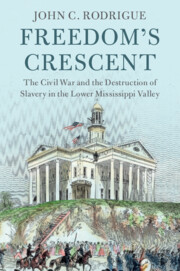Book contents
- Freedom’s Crescent
- Cambridge Studies on the American South
- Freedom’s Crescent
- Copyright page
- Dedication
- Epigraph
- Contents
- Figures
- Acknowledgments
- Abbreviations
- Additional material
- Introduction
- Prologue Life – and Labor – on the Mississippi
- Part I From War for Union to Military Emancipation, 1860–1862
- Part II From Military Emancipation to State Abolition, 1863
- Part III Abolition: State and Federal, 1864
- 10 “Slavery Is Incompatible with a Republican Form of Government”
- 11 Of Foul Combinations and the Common Object
- 12 “The Jewel of Liberty”
- 13 “The Virus of Slavery Is As Virulent As It Ever Was”
- 14 “No Longer Slaves but Freedmen”
- 15 “So Long As a Spark of Vitality Remains in the Institution of Slavery”
- 16 “Freedom, Full, Broad and Unconditional”
- 17 “To Resolve Never Again to Be Reduced to Slavery”
- Part IV The Destruction of Slavery, 1865
- Epilogue Memphis and New Orleans: May 1–3 and July 30, 1866
- Bibliography
- Index
11 - Of Foul Combinations and the Common Object
from Part III - Abolition: State and Federal, 1864
Published online by Cambridge University Press: 19 January 2023
- Freedom’s Crescent
- Cambridge Studies on the American South
- Freedom’s Crescent
- Copyright page
- Dedication
- Epigraph
- Contents
- Figures
- Acknowledgments
- Abbreviations
- Additional material
- Introduction
- Prologue Life – and Labor – on the Mississippi
- Part I From War for Union to Military Emancipation, 1860–1862
- Part II From Military Emancipation to State Abolition, 1863
- Part III Abolition: State and Federal, 1864
- 10 “Slavery Is Incompatible with a Republican Form of Government”
- 11 Of Foul Combinations and the Common Object
- 12 “The Jewel of Liberty”
- 13 “The Virus of Slavery Is As Virulent As It Ever Was”
- 14 “No Longer Slaves but Freedmen”
- 15 “So Long As a Spark of Vitality Remains in the Institution of Slavery”
- 16 “Freedom, Full, Broad and Unconditional”
- 17 “To Resolve Never Again to Be Reduced to Slavery”
- Part IV The Destruction of Slavery, 1865
- Epilogue Memphis and New Orleans: May 1–3 and July 30, 1866
- Bibliography
- Index
Summary
The organization of loyal governments on a free-state basis in Tennessee and Arkansas during early 1864. Unionists in Arkansas hold a constitutional convention in January and draft a state constitution prohibiting slavery. Despite logistical challenges, constitution gains approval by voters in Union-held Arkansas in March. In Tennessee, Andrew Johnson formulates plan to hold local elections before holding a state constitutional convention. Johnson’s plan includes a loyalty oath that imposes stricter requirements for voting than Lincoln’s ten-percent plan. Local elections take place and officials began assuming office, but the unsettled military situation in the state forces postponement of the plan to hold a state constitutional convention.
Keywords
- Type
- Chapter
- Information
- Freedom's CrescentThe Civil War and the Destruction of Slavery in the Lower Mississippi Valley, pp. 237 - 251Publisher: Cambridge University PressPrint publication year: 2023

